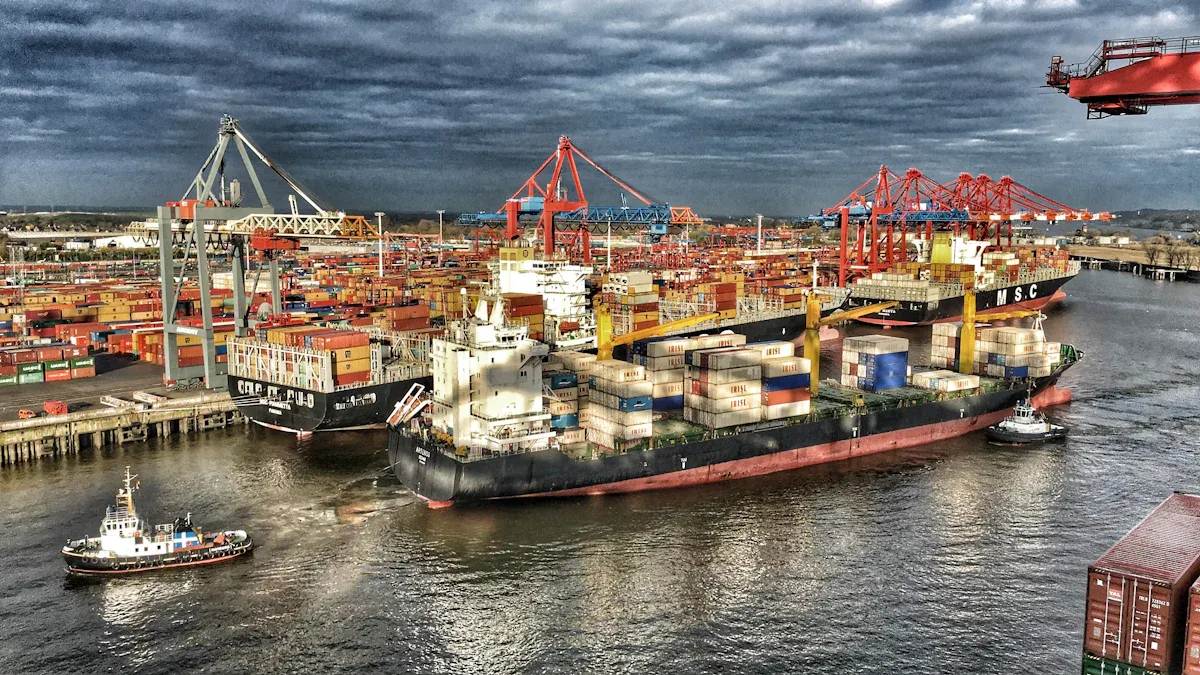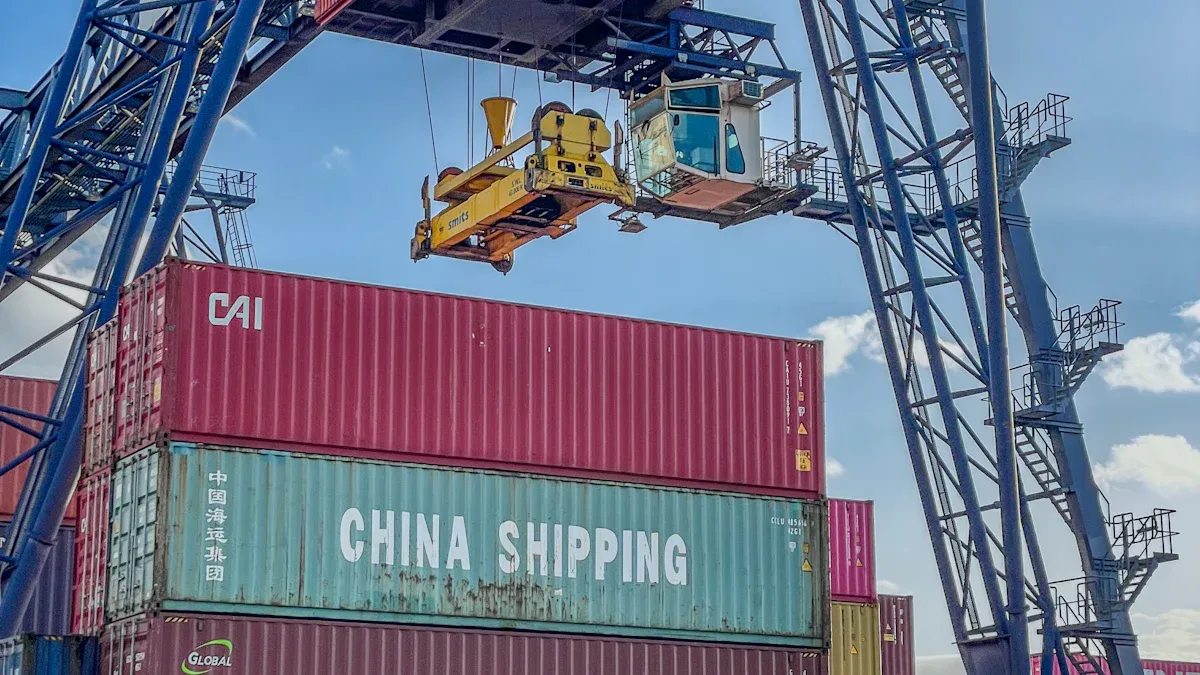Comparing the Best Logistics Companies for International Shipping

International trade relies heavily on the efficiency of logistics companies. These organizations ensure goods move seamlessly across borders, connecting businesses to global markets. The logistics industry, valued at $3,794.4 billion in 2023, is projected to grow at a 7.2% annual rate, reaching $5,951.0 billion by 2030. When choosing a logistics provider, you should consider factors like experience, reputation, and technology. A reliable logistics company can address challenges such as container shortages and volatile shipping prices, helping you optimize supply chains and meet customer expectations.
Key Takeaways
Pick a shipping company with good experience, reviews, and tools.
Check if they deliver on time and keep items safe.
Look for companies that care about the environment for better value.
Use tracking tools to see where shipments are and fix delays.
Review delivery speed and packaging to match your business needs.
Profiles of Top Logistics Companies

DHL
Global presence and market share
DHL stands out as one of the top logistics companies with a presence in over 220 countries and territories. Its extensive global network ensures seamless delivery solutions for businesses worldwide. The company generates annual revenue of approximately $20 billion, making it a leader in the logistics industry. DHL’s ability to handle over 1.5 billion packages annually highlights its operational scale and efficiency.
Industries served and key strengths
DHL serves a wide range of industries, including healthcare, retail, technology, and manufacturing. Its expertise in auto-mobility and chemicals further strengthens its position as a versatile logistics company. The table below summarizes its industry focus and key strengths:
Industries Served | Key Strengths |
|---|---|
Auto-mobility | Leading courier and air cargo player |
Chemicals | Extensive distribution network in over 220 countries and territories |
Consumer | Recognized for global services and delivery solutions |
Healthcare | Delivers over 1.5 billion packages annually |
Technology | Real-time efficient online tracking of goods for enhanced customer experience |
DHL’s commitment to sustainability, including the use of hybrid and electric vehicles, further enhances its appeal to environmentally conscious businesses.
FedEx
Global presence and market share
FedEx operates the world’s largest air cargo fleet, showcasing its unmatched global reach. The company focuses on air freight and e-commerce logistics, making it a leader in these sectors. Strategic initiatives like Network 2.0 and the DRIVE program aim to improve operational efficiency and expand its market share in high-margin industries such as healthcare and automotive logistics. FedEx’s efforts to capture a larger share of the European parcel market, valued at $130 billion, demonstrate its ambition to grow internationally.
Industries served and key strengths
FedEx offers specialized services across various industries. Its unique strengths include time-sensitive delivery options, cost-effective ground shipping, and supply chain optimization. The table below highlights its industry focus and key offerings:
Industry Served | Unique Strengths Offered |
|---|---|
FedEx Express | Time-sensitive delivery options including overnight, 2-day, and 3-day services. |
FedEx Ground | Cost-effective delivery solutions with transit times of one to five days. |
FedEx Freight | Services for larger and heavier shipments worldwide. |
FedEx Custom Critical | Specialized transportation for time-critical, high-value, or temperature-sensitive deliveries. |
FedEx Supply Chain | Optimization of supply chains through logistics management, warehousing, and order fulfillment services. |
FedEx’s focus on innovation and efficiency ensures reliable service for businesses of all sizes.
UPS
Global presence and market share
UPS has a strong presence in developed markets and is actively expanding into emerging markets like China, India, and Brazil. These regions offer significant growth potential due to rising e-commerce adoption and increasing consumer purchasing power. UPS’s strategic investments and partnerships in these markets aim to enhance its global footprint and capture new opportunities.
Industries served and key strengths
UPS focuses on healthcare logistics, e-commerce, and traditional package delivery. Its competitive advantages include a strong brand reputation, cutting-edge technology, and sustainability initiatives. The table below outlines its industry focus and strengths:
Industry Focus | Competitive Advantages |
|---|---|
Healthcare Logistics | Strong brand reputation, extensive global network |
E-commerce | Cutting-edge technology, sustainability initiatives |
Traditional Package Delivery | Comprehensive range of services |
UPS’s ability to balance operational efficiency with environmental responsibility makes it a preferred choice for businesses seeking reliable logistics solutions.
DB Schenker
Global presence and market share
DB Schenker ranks among the top logistics companies globally, recognized for its extensive network and comprehensive services. Operating in over 90 countries, it has established a vast presence that supports businesses worldwide. Following its acquisition by DSV, DB Schenker has become the largest freight forwarder by revenue and volume. This strategic move has strengthened its position in Europe and North America, where it holds a significant market share. With a combined workforce of 147,000 employees, the company delivers seamless logistics solutions across its global network.
Industries served and key strengths
DB Schenker specializes in several industries, including automotive, technology, and consumer goods. It also excels in niche areas like trade fair logistics, special transports, and event logistics. The company’s expertise lies in its ability to provide integrated and value-added services. These solutions enhance operational efficiency and streamline supply chain processes for its clients. Whether you need support with large-scale automotive shipments or specialized event logistics, DB Schenker offers tailored solutions to meet your needs.
JUSDA: A Rising Global Logistics Company
Overview of JUSDA’s global network and market presence
JUSDA is quickly emerging as a leader in the logistics industry. With over 155 service points worldwide and a warehouse area exceeding 2.5 million square meters, JUSDA has built a robust global network. Originating in China, the company has expanded its reach to support businesses across continents. Its focus on innovation and efficiency has positioned it as a trusted partner for companies seeking reliable logistics solutions. JUSDA’s China-Europe Express Rail service exemplifies its commitment to connecting markets through cost-effective and timely transportation options.
Industry-specific solutions and key strengths
JUSDA serves a diverse range of industries, including electronics, automotive, FMCG, and medical health. Its industry-specific solutions cater to the unique needs of each sector. For example, JUSDA provides specialized logistics for electronic manufacturing and automotive supply chains. The company’s JusLink intelligent supply chain platform integrates IoT, cloud computing, and big data to enhance real-time collaboration and visibility. By leveraging advanced technology, JUSDA ensures efficient customs operations and smooth cross-border logistics. Its ability to deliver tailored solutions makes it a rising star among top shipping lines.
Service Comparison of Top Logistics Companies
Types of Services Offered
Air freight, ocean freight, and rail transport
Top logistics companies provide a wide range of shipping services to meet diverse business needs. Air freight ensures speed and efficiency, making it ideal for time-sensitive shipments. Ocean freight offers a cost-effective solution for transporting large volumes of goods across continents. Rail transport bridges the gap between speed and cost, providing a reliable option for intercontinental shipping.
Here’s a quick overview of the primary shipping services offered:
Service Type | Description |
|---|---|
Air Freight | Transportation of goods via air, ensuring speed and efficiency. |
Ocean Freight | Shipping goods across oceans, suitable for large volumes and cost-effective for bulk shipments. |
Rail Freight | Cost-effective and timely transport for intercontinental shipping. |
Ground Freight | Land transportation options for various types of cargo. |
Customs Brokerage | Assistance with customs clearance and documentation for international shipments. |
Warehousing and distribution services
Warehousing and distribution services play a crucial role in supply chain management. Warehouses store goods for long-term or short-term periods, while distribution centers focus on rapid intake and delivery. Distribution centers also offer additional services like order fulfillment, packaging, and product mixing. These services ensure your products reach customers quickly and efficiently.
Aspect | Warehouse | Distribution Center |
|---|---|---|
Function | Rapidly processes products for distribution. | |
Activities | Storage and inventory management. | Order fulfillment, packaging, and shipping. |
Flow Rate | Slower turnover. | Faster turnover for quick delivery. |
Value-Added Features
Real-time tracking and visibility
Real-time tracking enhances your shipping experience by providing constant updates on shipment status. It improves efficiency by identifying potential delays early, allowing proactive solutions. This feature also increases cargo protection, reducing the risk of theft or damage.
Customs clearance and trade compliance support
Navigating customs regulations can be challenging. Leading logistics companies simplify this process by managing import and export compliance activities. They assist with necessary filings, provide tools for visibility, and ensure smooth customs clearance. These services reduce costs and expedite delivery.
Specialized solutions for perishable and hazardous goods
Shipping services for perishable and hazardous goods require specialized handling. Logistics providers offer temperature-controlled storage and transport for perishables. For hazardous goods, they ensure compliance with safety regulations, minimizing risks during transit.
JUSDA’s China-Europe Express Rail Service
Unique features of the China-Europe Express Rail
JUSDA’s China-Europe Express Rail offers a unique balance between speed and cost. It delivers goods in 15-20 days, faster than ocean freight and more affordable than air freight. The service supports a variety of goods, including electronics, clothing, and medical supplies. JUSDA’s expertise ensures smooth customs operations and reliable delivery.
Benefits for businesses shipping between China and Europe
This service provides significant advantages for businesses. It reduces transit times, enabling faster market entry. The cost-effectiveness of rail transport helps optimize logistics expenses. JUSDA’s extensive network ensures seamless cross-border operations, making it an ideal choice for companies shipping between China and Europe.
Performance and Reliability
On-Time Delivery and Safety Records
Comparison of delivery performance metrics
When evaluating logistics companies, you should focus on key performance metrics that reflect their reliability. These metrics help you understand how well a company meets delivery expectations and ensures safety. The table below highlights essential metrics used in the logistics industry:
Metric | Description |
|---|---|
On-Time Delivery (OTD) | Measures the percentage of deliveries made on time. |
Delivery in Full (DIF) | Assesses whether orders are delivered completely. |
Delivery In Full on Time (DIFOT) | Combines OTD and DIF to evaluate overall delivery success. |
Inventory Turns (days) | Indicates how often inventory is sold and replaced. |
Costs as a percentage of sales | Evaluates cost efficiency in relation to sales. |
Number of Reportable Injuries | Tracks safety incidents to ensure workforce safety. |
Accidents or Fatalities | Monitors severe safety outcomes to improve protocols. |
Among these, on-time delivery remains a critical factor. It ensures your goods reach their destination as scheduled, minimizing disruptions in your supply chain.
Handling of goods and damage rates
Safe handling of goods is vital for maintaining product quality during transit. Leading logistics companies follow several practices to reduce damage rates:
Utilize technology for real-time monitoring of shipments.
Secure warehousing and storage facilities.
Collaborate with trusted partners to ensure consistent service.
Enhance cybersecurity measures to protect sensitive data.
Adopt risk management practices to identify and mitigate potential issues.
Comply with regulatory standards to maintain operational integrity.
These measures ensure your shipments remain safe and intact, reducing the risk of financial losses.
JUSDA’s Commitment to Reliability
Efficient customs operations and resource alignment
JUSDA excels in ensuring smooth customs operations. The company’s extensive network and expertise streamline the clearance process, reducing delays. By aligning resources effectively, JUSDA minimizes the risk of goods being stranded at borders. This efficiency enhances your ability to meet on-time delivery goals, even for complex international shipments.
Real-time collaboration through JusLink intelligent supply chain
JUSDA’s JusLink platform takes reliability to the next level. It integrates IoT, cloud computing, and big data to provide real-time visibility across the supply chain. This technology allows you to monitor shipments, collaborate with partners, and address issues proactively. JusLink ensures seamless communication, helping you maintain consistent delivery performance and achieve supply chain efficiency.
Cost and Pricing
Pricing Models Across Logistics Companies
Flat-rate, volume-based, and custom pricing
Logistics companies use different pricing models to meet the needs of businesses. Flat-rate pricing offers a fixed monthly fee that includes storage and additional services. This model provides predictable costs, making it easier for you to budget without worrying about unexpected expenses. On the other hand, variable pricing charges based on the space you use. This approach gives you flexibility, especially if your storage needs change frequently. By using smaller amounts of storage more often, you can save money compared to flat-rate models.
Custom pricing is another option that tailors costs to your specific requirements. This model works well for businesses with unique shipping needs, such as transporting oversized goods or requiring specialized handling. Understanding these pricing structures helps you choose the best option for your business.
Cost-effectiveness for small and large shipments
Balancing cost-effectiveness with service quality is essential for both small and large shipments. Logistics companies achieve this by:
Optimizing inventory management to avoid overstocking.
Negotiating better shipping rates to lower transportation costs.
Leveraging technology for automation and efficiency.
Maximizing warehouse space to cut storage expenses.
Offering flexible shipping options to meet your needs.
Outsourcing to third-party providers for expertise and savings.
These strategies ensure you get reliable service without overspending.
Balancing Cost and Quality
Hidden fees and surcharges to consider
When choosing a logistics provider, you should watch for hidden fees that can increase your costs. Common surcharges include:
Hidden Fees/Surcharges | Description |
|---|---|
Regulatory and Compliance Costs | Costs for meeting federal and state regulations, often passed to shippers. |
Customs and Brokerage Fees | Duties, tariffs, and inspection fees for international shipments. |
Inefficiencies in Supply Chain | Expenses from outdated warehouse designs or inefficient logistics practices. |
Being aware of these fees helps you avoid surprises and manage your budget effectively.
JUSDA’s cost-effective solutions, including the China-Europe Express Rail
JUSDA offers innovative solutions to balance cost and quality. Its China-Europe Express Rail service provides a faster alternative to sea freight and a more affordable option than air freight. With transit times of 15-20 days, this service ensures timely delivery while keeping costs low. JUSDA’s expertise in customs operations and its JusLink intelligent supply chain platform further enhance efficiency. These features make JUSDA a cost-effective choice for businesses shipping between China and Europe.
Environmental and Social Responsibility

Sustainability Initiatives
Eco-friendly transportation methods and carbon offset programs
You can see a growing trend in logistics companies adopting eco-friendly practices to reduce their environmental impact. These methods include:
Decarbonization: Companies are switching to electric vehicle fleets and using Sustainable Aviation Fuel (SAF) to cut emissions.
Green energy solutions: Solar and wind energy power logistics operations, reducing reliance on fossil fuels.
AI innovations: Advanced AI tools optimize routes and forecast demand, minimizing unnecessary fuel consumption.
Reverse logistics: Recycling and repurposing materials through reverse logistics promote sustainability.
Sustainable packaging: Reducing excessive packaging meets the demands of eco-conscious consumers.
Carbon offset programs also play a vital role in mitigating environmental damage. Here are some effective initiatives:
Carbon Offset Program | Description |
|---|---|
Renewable energy development | Projects generating energy from renewable sources to replace fossil fuels. |
Reforestation | Planting trees to absorb CO2. One tonne of CO2 requires 31-46 trees. |
Methane capture from landfills | Capturing methane emissions to prevent them from entering the atmosphere. |
Programs like DP World's "Our World, Our Future" aim for carbon neutrality by 2040 and net-zero emissions by 2050, setting a benchmark for the industry.
JUSDA’s efforts in sustainable logistics and green supply chains
JUSDA actively contributes to sustainable logistics by integrating green practices into its operations. The company’s China-Europe Express Rail service offers a low-emission alternative to air and sea freight. By leveraging its JusLink intelligent supply chain platform, JUSDA optimizes routes and reduces waste, enhancing efficiency while lowering its carbon footprint. These efforts align with global sustainability goals, making JUSDA a leader in green supply chain solutions.
Corporate Social Responsibility (CSR)
Community engagement and ethical practices
Logistics companies often engage with communities to create a positive social impact. For example:
FedEx collaborates with the National Fish and Wildlife Foundation to protect ecosystems.
Maersk partners with The Ocean Cleanup to remove plastic waste from oceans.
DHL encourages employee volunteerism through its "Living Responsibility Fund."
These initiatives demonstrate how logistics providers prioritize ethical practices and community well-being.
Employee welfare and diversity initiatives
Employee welfare remains a cornerstone of corporate responsibility. Companies like DHL implement health and wellness programs to boost job satisfaction. UPS focuses on workplace safety through regular training, while XPO Logistics fosters inclusivity with diverse hiring practices. Mental health support, such as awareness campaigns and resources, further enhances employee morale. By promoting diversity and well-being, logistics companies create a supportive and productive work environment.

JUSDA Solutions
To provide you with professional solutions and quotations.
Choosing the right logistics company can transform your supply chain. Focus on factors like experience, reputation, and technology. Evaluate their ability to deliver on time, handle goods safely, and provide reliable customer support. Companies that prioritize sustainability and innovation often offer long-term value.
JUSDA stands out with its extensive global network, managing over 2,000 international routes and operating 155 distribution centers. Its China-Europe Express Rail service offers a cost-effective and timely solution for businesses shipping between continents. With over 2.5 million square meters of warehouse space and advanced technology like JusLink, JUSDA ensures seamless logistics operations.
To select the best logistics partner, follow these steps:
Assess their readiness to adopt emerging technologies.
Review customer experience metrics like delivery speed and packaging quality.
Evaluate their scalability to match your growth needs.
Analyze their commitment to sustainability and green initiatives.
Use feedback from internal teams to strengthen the partnership.
By taking these steps, you can align your logistics strategy with your business goals and achieve greater efficiency.
See Also
Discover The Best Global Logistics Companies In Detail
Exploring The Latest Trends In Sea Freight Logistics 2024
Top Reasons To Join These Essential Logistics Webinars
Five Leading Logistics Programs To Watch In 2024
Transforming Logistics Through Innovative Supply Chain Strategies
